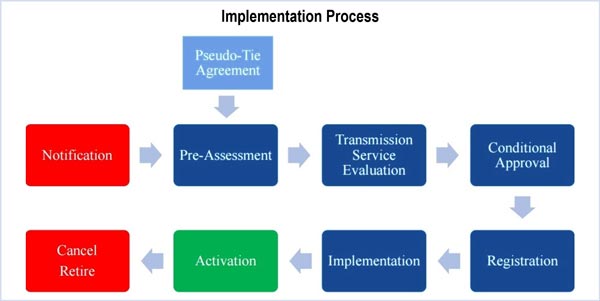By Amanda Durish Cook
MISO will ask FERC to approve new rules on how it manages pseudo-ties next year, officials said during a Nov. 8 special conference call of the Reliability Subcommittee.
The proposed rules would establish a pseudo-tie Business Practices Manual, an implementation process and a written agreement for MISO-based generators that intend to sell their capacity or electricity outside the region.
The agreement serves as a contract between MISO and pseudo-tie owners and ensures “appropriate metering is in place” before pseudo-ties are granted, the RTO said. MISO Corporate Counsel Michael Blackwell said the agreement would be filed as a pro forma attachment to the RTO’s Tariff. Executed pseudo-tie agreements would be filed with FERC through MISO’s electronic quarterly reports.
The process will require market participants to maintain long-term firm transmission service requests from source to sink for the life of the pseudo-tie. New transmission service requests would be subjected to system impact studies. Currently, units pseudo-tied into MISO require transmission service from the external transmission owner, and units pseudo-tied out require transmission service from MISO.
The BPM will include a step-by-step guide to implementing a pseudo-tie, which involves pre-assessment and transmission service evaluation before conditional approval and registration. (See “Pseudo-Ties to Require System Impact Studies; Would be Barred from Sink Switching,” MISO Planning Subcommittee Briefs.)
MISO would require a one-year notification for generators wishing to pseudo-tie. Kyle Abell, of MISO’s modeling and engineering division, said neighboring RTOs — such as PJM, with its three-year forward market — may require more notification time for generators looking to be controlled and dispatched by a neighboring balancing authority.
The process also includes a new requirement that all parties — generators and RTOs — agree on a plan for congestion management prior to approval of new pseudo-ties. That could require the creation of new flowgates and modeling improvements.
Senior Director of Regional Operations David Zwergel said modeling needs to be sufficient to accurately calculate transmission flows and avoid overwhelming the system.
Abell said MISO hopes to file the new process early in the first quarter of 2017, implementing it before the next batch of pseudo-tied generators withdraw their capacity from MISO in June.
“It’s our goal to strike the right balance between brevity and clarity,” Abell said.
Current pseudo-ties with long-term transmission service can continue to use the granted requests. Abell said existing transmission service requests will be honored under the same rules, but some existing requests not used for pseudo-ties could be subject to restudies to ensure they meet new criteria.
“We’ll take a look at it to see how it was studied. … If we find it meets the [new] criteria, you’re good to go,” MISO’s Paul Muncy said. Rollover rights on transmission service requests will continue to be honored, Muncy added.
“It’s not MISO’s goal to retroactively revise pseudo-ties. We’re focused on new pseudo-ties moving forward,” Abell said.
Proposed pseudo-ties can be rejected and existing pseudo-ties can be rescinded if a market-to-market flowgate is not within 2% of MISO and the neighboring market’s generator-to-load distribution factor. Such determinations will rely on the past 24 months of flowgate data.
Pseudo-ties to non-market areas, such as the Tennessee Valley Authority, will be modeled as network-and-native load under NERC’s transmission loading relief curtailment standards and be subject to manual dispatch. Abell said the provisions apply to new pseudo-tie requests and not to pseudo-ties already in place.
Ameren’s Ray McCausland asked how the sub-regional power balance constraint would factor into the granting of MISO’s pseudo-tie requests. MISO staff said they would investigate that aspect.
Abell asked for stakeholder comment by Nov. 22. MISO will hold another conference on the pseudo-tie rules and consider possible revisions during a special Dec. 12 meeting of the Reliability Subcommittee.





